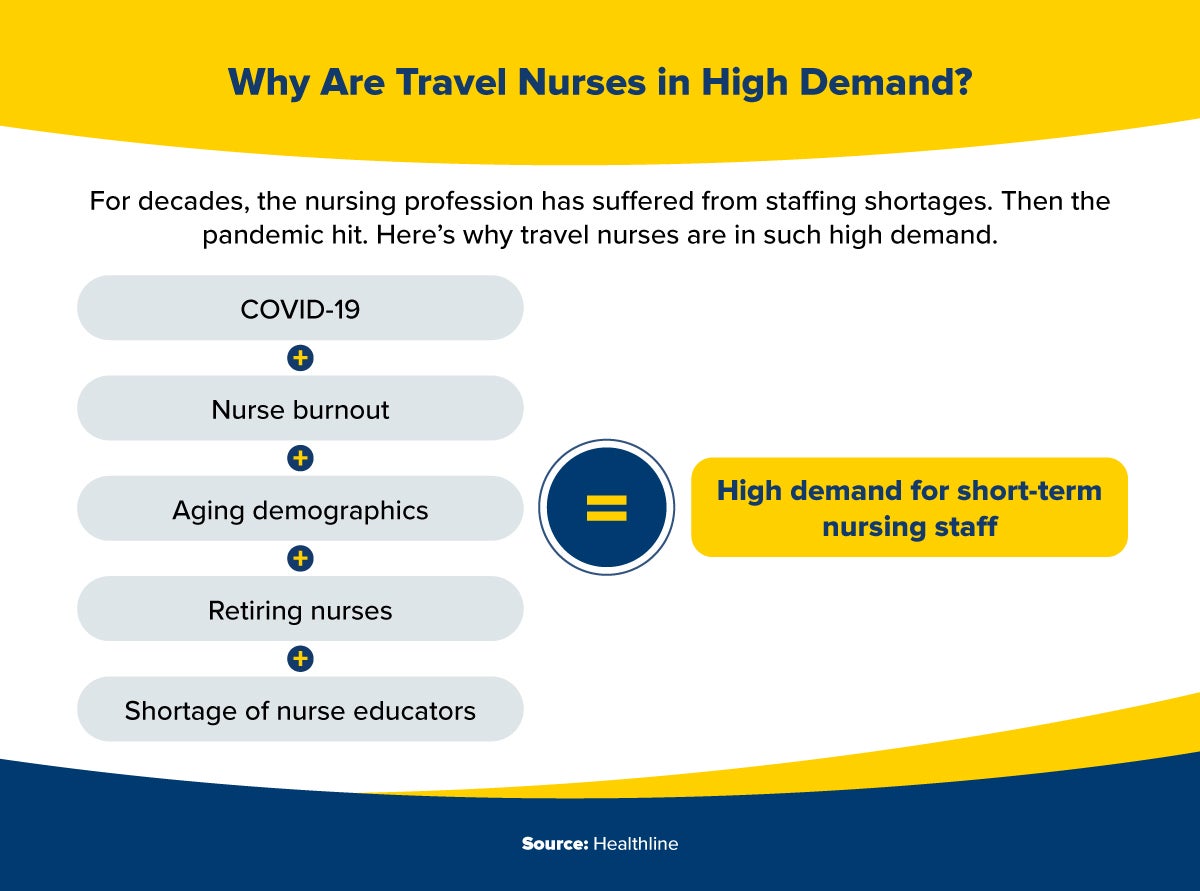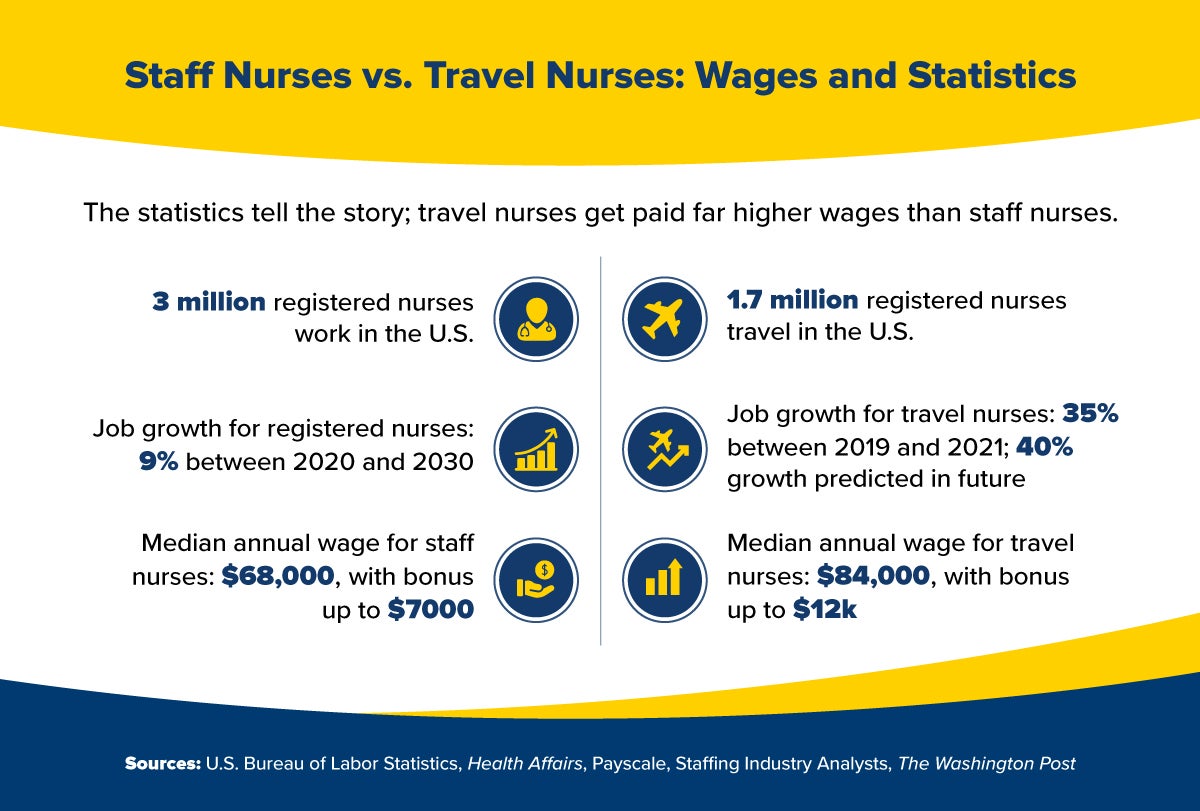Pros and Cons of Being a Travel Nurse

The COVID-19 pandemic put a spotlight on the nursing shortage in the U.S. The U.S. Bureau of Labor Statistics (BLS) estimates the demand for nurses to grow by 9% between 2020 and 2030. The workload and working conditions caused many nurses to retire early or leave the profession altogether. Others took a different route — they became travel nurses.
Travel nurses fill assignments at various hospitals around the country, often earning higher wages than when they worked on staff. Some travel nurses earn more than $100,000 a year, including bonuses and overtime, although amounts depend on location and type of contract.
The many travel nurse benefits include higher pay, a choice of assignments and a chance to see different parts of the country. However, experts say that downsides exist as well. Discover whether becoming a travel nurse is the right choice for you.
What’s It Like Being a Travel Nurse?
The life of a travel nurse can be one of variety and excitement. It can also be challenging. Short stints mean that nurses don’t have the luxury of taking a long time to warm up to colleagues or gain rapport — they have to be able to work well with a new team from the first day.

Experienced travel nurses quickly learn how to prepare for a new contract to ensure that everything goes smoothly.
- Arrive. When travel nurses arrive at their destination, they move into temporary housing. Experienced nurses recommend visiting the hospital the day before they are to start to scope things out, like traffic and parking.
- Receive first-day orientation. As with any new job, nurses go through orientation, which may require full onboarding or more streamlined training depending on agency protocol.
- Meeting colleagues. Travel nurses get a tour of the hosptial, meet their new colleagues and find out the scope of their position.
- See patients. Travel nurses see patients, coordinate care and communicate with doctors and other specialists. Travel nurses may float between departments as needed.
- Explore. Many travel nurses use their off time to explore their new location or get into a routine with calls to family, exercise and hobbies.
- Work hard. Some nurses use the opportunity to take advantage of high pay. Hospitals that hire travel nurses are usually short-staffed and thus often offer plenty of overtime.
Most travel nursing contracts are planned well in advance, with plenty of time for nurses to prepare for the new stint. Other assignments are “quick start” contracts. With the pandemic-induced nursing shortage, many quick start contracts are related to COVID.
These contracts require fast turnaround, with only a week or two to prepare. Nurses need to have a current RN license in the state where the hospital is located, immunizations, background check and other documentation in place, as these assignments need someone who can be on-site in only a few days. Nurses can also earn a Nurse Licensure Compact (NLC), which enables them to practice in in other NLC-participating states without earning additional certifications or licenses.
How Does Travel Nursing Work?
Hospitals hire travel nurses to fill in staffing shortages at their facilities. Agencies work closely with different hospitals to fill their open positions in coordination with the nurse recruiting and staffing offices. These positions are short term, usually about 12 to 13 weeks long, but they can be longer.
Travel nurses work with medical staffing agencies to find placements and depend on the agencies to handle all the planning and logistics for each contract. In return, the agency receives part of the revenue paid by the hospital or facility for service and pays the travel nurse the contracted rate.
Experienced travel nurses work with numerous agencies because that’s often the best way to be notified of a wider variety of different assignments.
It is important to note that nurses don’t work for the hospitals, but for the agencies that place them. These agencies have contracts with the hospitals, through a vendor management system (VMS) agreement or through a master service provider (MSP). Often, many layers of contracts exist between the nurses and the hospitals where they’re posted because of this arrangement.
Since the agencies employ the travel nurses, the agencies compensate them, rather than the hospitals. Pay packages vary depending on how the nurses are compensated, if they’re taking reimbursements or finding their own housing, and other factors.
Besides the contract, agencies take care of most of the details, large and small, that can make a travel nurse’s assignment run smoothly. The following are some of the agency’s responsibilities:
Salary and Benefits
Travel nurses contract with the agencies, not the hospitals they’re assigned to. Agencies are responsible for paying wages. Some agencies may also offer health insurance and benefits to the nurses they represent.
Housing
Agencies either arrange a housing stipend or provide agency-provided housing. Some nurses prefer agency-provided housing. That solves the problem of having to find an apartment or a house; they may not know how close they need to be to the hospital and what to expect in terms of traffic or other issues. The housing stipend, on the other hand, is tax free. Some nurses may choose the stipend and make their own arrangements.
Per Diems and Reimbursements
Agencies also ensure that travel nurses get per diems for meals and other expenses and are reimbursed for travel. They can also arrange travel for family and pets. These payments are tax free, which is another perk of the travel nursing career.
Licensing, Certifications and Paperwork
Agencies help their travel nurses meet the licensing requirements in the states where they work. They facilitate all the paperwork and keep the information on file. Records include licensure, vaccinations, drug screens and background checks, as well as any other documentation.
Educational Opportunities
The field of nursing calls for continuing professional education. Agencies offer opportunities to travel nurses to participate in seminars to advance their knowledge and skills. Some agencies reimburse nurses for membership dues and conferences as part of their compensation packages.
Assignments
Medical staffing agencies are also responsible for what hospital unity travel nurses are assigned to. They may take into account a nurse’s specializations or experiences when finding the right placement. Staffing agencies usually conduct an intake to determine the best fit in terms of location, department, shift or other factors.
How to Become a Travel Nurse
Most nurses have at least one to two years of experience as staff registered nurses (RNs) before they transition to travel nursing. Some hospital departments, such as the intensive care unit, may require more experience before they hire a travel nurse for that position. A successful career as a travel nurse requires the following elements:
Licensing, Credentials and Certifications
Licensing, credentials and certifications are necessary to become a travel nurse. Most travel nurses are RNs, although there may be some travel jobs for licensed practical nurses (LPNs). Nurses must be licensed by the state where they’re working. Many agencies handle the licensure process for their travel nurses. Certifications such as advanced cardiovascular life support (ACLS) and Basic Life Support (BLS) are also a requirement.
Communication Skills
Nursing in general requires excellent communication skills, especially as hospitals move toward patient-centered care and collaboration in the nursing department and across departments. Travel nurses take short stints and work with new colleagues and in different workplaces with every assignment. Good communication is essential to being a successful travel nurse.
Adaptability
Being flexible is another key skill because travel nurses have to adapt quickly to a new work culture. While it’s a myth that travel nurses get the worst assignments, nurses may not have their first pick. Some hospitals may float their travel nurses, requiring them to move from one unit to another. Travel nurses who are willing to float are in high demand.
Know What You Want
At the same time, travel nurses should identify what they’re looking for. Not all travel nursing jobs are alike. Experienced travel nurses work with their recruiters to establish the assignments, departments, shifts, locations and length of contracts they want.
Financial Expertise
When nurses move from staff to travel assignments, the structure of their compensation changes. Part of their compensation is taxed; part is tax free (e.g. housing stipends). Nurses may work for one agency and get their benefits through that agency, or they may work with several agencies and handle their healthcare and retirement individually. Understanding the financial impact of travel nursing will ensure that there are no surprises at tax time.
The Benefits of Being a Travel Nurse
Many benefits of being a travel nurse exist. Pay, flexible assignments and the chance to travel are just some of the reasons that RNs choose to become travel nurses. Following are the top advantages of being a travel nurse:
Compensation
Hospitals pay a significant premium for travel nurses. According to Payscale, travel nurses are paid a median annual wage of about $84,000, as of March 2022. Compare this to the approximate $68,000 median salary for staff RNs for the same period. In some markets, travel nurses receive $10,000 per week. Travel nurses also receive overtime pay, and because their base pay is so high, overtime can be substantial.
Stipends and Other Perks
Travel nurses receive housing stipends, travel reimbursements and per diems. Some of these payments are nontaxable. Agencies may also provide housing for travel nurses. These benefits can smooth the way for a travel nurse to focus on the job and save money and time in the long run.
Choice of Contracts
Many travel nurses enjoy the flexibility that comes with being able to choose their contracts. They like having control over where they’ll work, in what department and in what shift. Some nurses may prefer the night shift, which pays more. Hospitals may block schedule travel nurses, just because it’s easier for scheduling.
Avoiding Workplace Conflicts
Nursing is a highly stressful profession. As a result, sometimes emotions can run high, and colleagues get short with one another. The nature of travel nursing means that travel nurses don’t have to get involved in hospital politics.
Travel to New Places
Experienced travel nurses embrace the opportunity to see new places. Nurses are in demand everywhere, whether in small towns or in desirable cities. Many nurses enjoy the chance to live and work in locations that they otherwise would never have visited.
Expand Marketable Skills
Many travel nurses use the opportunity to expand their skills in different departments or in different types of care. Hiring managers also look at travel nurses favorably, since they’re apt to be open to new ways of doing things and they’re looking for a challenge. Travel nursing experience is an asset when looking for a new job.
Try Out New Hospitals
Another benefit of travel nursing is the chance to explore new hospitals or healthcare systems in the event they decide to take on a staff role. Nurses who float may discover that they enjoy a department they had never considered before. Travel nurses may decide to settle down in an area where they’ve been assigned.
Disadvantages of Being a Travel Nurse
Of course, travel nursing can have disadvantages. However, nurses who take the time to research the ins and outs of travel nursing are better prepared for the downsides. Some of the disadvantages of travel nursing include the following:
Financial Literacy
The agencies that place travel nurses in an assignment as contract employees pay them. Their compensation is a combination of taxable and nontaxable income. This means that nurses must be knowledgeable about taxes and make sure that they’re set up properly to avoid IRS penalties.
Another financial decision that has to be made is whether or not to maintain a permanent residence. Most travel nurses have a home base, so while they’re on assignment, they also have to pay rent or a mortgage. Although nurses are very well paid, they need to be financially savvy to make sure that they don’t experience unexpected financial issues. Nurses who work with a tax accountant will have a better understanding of their options, turning their newfound financial literacy into a benefit, rather than a pitfall.
Healthcare and Retirement Benefits
Some agencies offer healthcare insurance and retirement benefits. However, since many nurses work for several agencies or switch agencies over the course of their careers, they may have to be proactive about setting up retirement accounts. If agencies do not offer benefits, nurses will have to individually account for their own benefits. Agencies also normally do not usually provide nurses with paid time off (PTO), which means that they will need to financially manage their own time off.
Nurses should be aware of the benefits of an agency or research their options to make sure that they aren’t losing out on retirement or healthcare options. Again, a financial advisor could be helpful, and nurses will have the added benefit of being more aware of their options.
Lack of a Support System
Travel nurses are vulnerable to the same issues of burnout and compassion fatigue as staff nurses. They may also be more susceptible since they’re far from their support system. While the pandemic offered many opportunities for travel nurses, the loss of patients they cared for, and the mounting death toll impacted them.
Loneliness
Travel nurses have to leave friends and families for weeks and even months at a time. Nurses have different ways to manage being away from loved ones. Some may embrace the experience to try new activities, sightsee or join like-minded groups. Others may put all their energy into their work to forget their loneliness. Travel nursing may be hard on nurses who get homesick.
Advice to combat loneliness includes the following:
- Practice self-care . Running, yoga, massage therapy and other self-care options can help nurses stave off the blues.
- Create a routine. Routines can be comforting and take away some of the sting of loneliness.
- Make a home. Corporate housing can feel sterile and unwelcoming. Add touches to make a temporary home feel welcoming and inviting.
- Keep in touch. Videoconferencing can help nurses keep in touch with loved ones.
- Reach out. Even though assignments are short, travel nurses also make friends with their new staff colleagues as well as other travel nurses on the same assignment.
Lack of Rapport With Colleagues
Nursing requires communication and teamwork. However, travel nurses may not have a chance to achieve a rapport with their colleagues while on assignment. Some ways to connect with a team include making the first move and reaching out to colleagues. Travel nurses can also ask to be assigned to a mentor.
Creating a rapport with colleagues can also build a welcoming work environment both for the travel nurse and for permanent staff.
Career Development Challenges
Because travel nurses are not full-time, tenured staff, they may miss out on some of the career development opportunities offered by the hospitals they are assigned to. These can include tuition assistance and reimbursement, clinical ladders promoting professional development and mentoring, and leadership opportunities.
Pushback Over High Wages
Travel nurses get paid so much more than staff nurses that many healthcare experts think it’s exacerbating the nursing shortage. That’s because as more nurses become travel nurses, the remaining staff is more overworked. At least one hospital has sued a travel nursing agency, alleging price gouging. Some lawmakers have called for an investigation into nursing agencies.
Is Travel Nursing Right for You?
Travel nurse benefits are many, from high wages to the excitement of living and working in a new city. However, disadvantages of being a travel nurse also exist, including working on a contract basis that can impact benefits and lacking a support system. Understanding the pros and cons of travel nursing is the first step toward determining if this exciting career is right for you.
Learn More about SAU’s Online MSN.
Infographic Sources:
Healthline, “Understanding the American Nursing Shortage”
PayScale, “Average Registered Nurse (RN) Hourly Pay”
PayScale, “Average Travel Nurse (RN) Hourly Pay”
Staffing Industry Analysts, “Healthcare Staffing to Grow 24% this Year: SIA Forecast”











